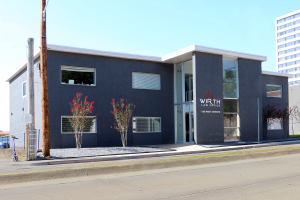Tulsa Attorney James Wirth explains what you should expect at a full protective order hearing.

Video Transcribed: Step 4 in the protective order process, that is the full hearing. I’m Oklahoma Attorney James Wirth and I’m about to tell you what to expect at a full protective order hearing.
Okay. So, you filed for a protective order or the other side filed for a protective order, and it’s been set for the full hearing. That is the opportunity for both sides to be heard, where there’s an opportunity to have a court reporter present, which you definitely want to request, and an opportunity to cross-examine on both sides, bring witnesses, introduce evidence. Okay. But it doesn’t always happen at the first setting of the full hearing. So you will want to be prepared for there to be a continuance. For example, in Tulsa County, the general rule is that each party can request one continuance of the protective order hearing.
So if the defendant shows up and says, “I want an attorney, can I have a continuance?” The judge is probably going to grant it. If the plaintiff shows up and said, “Oh, I didn’t know the defendant was going to show up with an attorney. Can I have a pass?” The judge is probably going to grant it. Generally, each party gets one continuance but only one continuance in Tulsa County. Another reason separate from that it could be continued, though, is if there is a domestic case going on. So let’s say that the parties are married and that one of the parties filed for divorce.
Well, the divorce is not going to be set before the same judge automatically in the larger counties like Tulsa County. It’s going to be set before the protective order judge on a separate docket. But if there’s a family law case, we don’t need to hear these allegations twice. So for judicial economy, they’re generally consolidated and set before the judge that’s handling the divorce, or the paternity case, or the custody case, or the legal separation case. So that’s another reason why it may be passed in order to get it before a consolidated judge, the case that way.
Also, if there are criminal charges relevant to this, if we’ve got a serious allegation of domestic violence or rape or other things like that, and it’s likely there’s going to be a criminal case, it is common for a defendant to request a pass to trail that case. Because in a criminal case, the defendant cannot be compelled to testify, has fifth amendment rights.
But it’s not as clear in a civil case. You can still assert your fifth amendment rights, and generally those are utilized in order to continue that case, but that’s going to be an option for the defendant to make that election. But it is common for it to be continued for that basis if there is prosecution or likelihood of prosecution. Also, based on new case law, there is a right to do discovery in protective order cases.
That’s another reason the case could be continued. Because generally, protective order hearings, they’re set within about two weeks, 14 days of the emergency being granted or denied. Most of the time they’re granted, but sometimes they’re denied and still set. So discovery requests allow 30 days to have responses. So if you’re allowed to do discovery, then that means that there’s allowed to do a continuance in order to complete discovery.
So if the defendant has more information about, or wants more  information about what the allegations are, the defendant could send out interrogatories, which are just written questions.
information about what the allegations are, the defendant could send out interrogatories, which are just written questions.
The defendant could request depositions, could send out requests for admissions, request for production, which is basically documentation. They could request transcripts from text messages or emails, and send out subpoenas for those. All of that is part of discovery based on recent case law that is allowable in protective orders and could be a reason for a continuance on a protective order.
But if the case goes to a hearing on that date, the judge is essentially going to ask the plaintiff, “Do you still feel you’re in need of protection?” The judge is thinking to ask the defendant, “Do you agree to the granting of the protective order, or do you want a hearing?” If the plaintiff says that they still want the protective order, defendant says that they’re not willing to agree to the protective order, then it goes to a hearing.
The parties are going to be put under oath and questions are going to be asked to see if they meet the requirements for one of those grounds. Harassment, stalking, domestic violence, threats of imminent harm, rape, or victim of certain types of crime. The judge will make that determination based on not clear and convincing evidence, not beyond a reasonable doubt, but by a preponderance of the evidence, more likely than not is all that it takes to do that.
So you’re probably going to want to have representation for that hearing. You’re definitely going to want to have a court reporter present, so if it doesn’t go the way you want, you have a record that you can appeal, and you’re going to want to be prepared to ask questions, to cross-examine, to give testimony, to enter evidence.
There’s a lot that goes into it, but that’s a general nutshell of what to expect at that full hearing and the number of different ways it can go. But don’t take my word for it. Don’t take this general advice. Talk to an attorney about your specific circumstances, about in your specific county and your specific likely judge. If you want to talk to me about specifics, give me a call, (918) 879-1681, or go to the website wirthlawoffice.com.




























